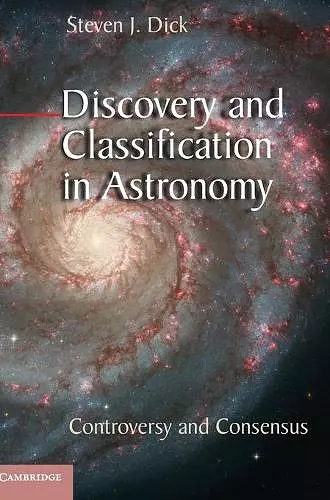Discovery and Classification in Astronomy
Controversy and Consensus
Format:Hardback
Publisher:Cambridge University Press
Published:9th Sep '13
Currently unavailable, and unfortunately no date known when it will be back

This book shows that astronomical discovery is a complex and ongoing process comprising various stages of research, interpretation and understanding.
This comprehensive history traces more than 400 years of telescopic observation, exploring how the signal discoveries of new astronomical objects relate to and inform one another, and why controversies such as Pluto's reclassification as a dwarf planet in 2006 are commonplace in astronomy.Astronomical discovery involves more than detecting something previously unseen. The reclassification of Pluto as a dwarf planet in 2006, and the controversy it generated, shows that discovery is a complex and ongoing process – one comprising various stages of research, interpretation and understanding. Ranging from Galileo's observation of Jupiter's satellites, Saturn's rings and star clusters, to Herschel's nebulae and the modern discovery of quasars and pulsars, Steven J. Dick's comprehensive history identifies the concept of 'extended discovery' as the engine of progress in astronomy. The text traces more than 400 years of telescopic observation, exploring how the signal discoveries of new astronomical objects relate to and inform one another, and why controversies such as Pluto's reclassification are commonplace in the field. The volume is complete with a detailed classification system for known classes of astronomical objects, offering students, researchers and amateur observers a valuable reference and guide.
'A highly accessible collection of narrative case studies that explore how the discipline of astronomy has gone about detecting new classes of phenomena and then has decided if, indeed, these new classes are in fact new, or whether they are actually variations or extremes of previously known classes. The bold ambition of the book, to craft a systematic hierarchical classification of all astronomical phenomena, to aid in forming and reforming taxonomies for future discoveries of new astronomical phenomena is, indeed, a goal that should be of great interest to scientists, historians, sociologists and philosophers.' David H. DeVorkin, National Air and Space Museum
'In challenging widely accepted ideas about the nature of scientific discovery, Steven J. Dick has written a bold and compelling book that will surely prove to be one of the most important works in the history of astronomy published in recent years. It is both an account of observational astronomy since the early seventeenth century as well as a deeply thought out and highly original investigation of the notions of discovery and classification in astronomy.' Robert Smith, University of Alberta
'Astronomy is an observational science so astronomers don't do experiments. They only observe, gather data, classify, interpret, define, and perhaps understand. Building on the foundation established by Martin Harwit more than thirty years ago, Steven J. Dick articulates a fascinating tale of discoveries, missed discoveries, and rediscoveries, explaining the unappreciated but nevertheless often significant role of luck, culture, sociology, and the importance of a firm and unambiguous recognized statement or claim of discovery. Discovery and Classification in Astronomy weaves the tortuous path between discovery and classification including the impact of recognizing or even merely defining or renaming celestial bodies or phenomena so vividly illustrated by the unexpected emotional public as well as professional controversy over the 2006 IAU reclassification which downgraded Pluto to a seemingly lowly 'dwarf planet' status.' Ken Kellermann, National Radio Astronomy Observatory
'… an excellent history of the development of modern astrophysics, illuminated by specific examples … Highly recommended.' D. E. Hogg, Choice
'… an extraordinarily ambitious work by a renowned historian of astronomy … a major resource to philosophers, historians and astronomers alike … Dick's extensive system of classification … is an extraordinary feat, a major contribution to the pedagogy of astronomy …' Omar W. Nasim, Metascience
'Steven J. Dick, in this rich and enlightening book, attempts to bridge these realms of scientific practice and disciplinary work through a detailed analysis of one particularly intriguing category of discovery, that of astronomical objects … Extraordinarily wide-ranging and detailed, [the] second part of the book provides a beautifully written, authoritative account of the non-mathematical facets of astronomical work since Galileo. An impressive work of synthesis, Dick's account ranges across the planetary, stellar and galactic realms, revealing humankind's dramatic transformation in understanding of the nature and structure of the universe since the Renaissance, whilst demonstrating the centrality of discovery and classification to that change.' Joshua Nall, The British Journal for the History of Science
'… Dick has given us an excellent and comprehensive treatise on the science, history, philosophy, and sociology of discovery and classification in astronomy. There is much to take from [his] work, both from the elaborate scientific and historical details of the case studies and from the rich analyses of them from a synergetic science studies perspective.' Sindhuja Bhakthavatsalam, Philosophy of Science
'… an intellectual banquet … composed of different courses: first an introductory entrée, followed by a main course comprising historical narrative garnished with theory provided by the history of science, and then a dessert that looks at the the present and the future of astronomical discovery. It is masterfully written (as are all of Steven J. Dick's books), and is full of thought-provoking ideas and discussion. … it is very well-priced, and should join the bookshelf of many astronomers - not just those committed to the history of astronomy.' Wayne Orchiston, Journal of Astronomical History and Heritage
ISBN: 9781107033610
Dimensions: 254mm x 181mm x 27mm
Weight: 960g
472 pages